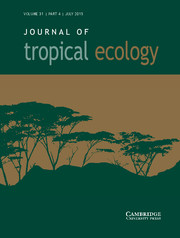Crossref Citations
This article has been cited by the following publications. This list is generated based on data provided by
Crossref.
Mistry, Jayalaxshmi
2001.
Savannas.
Progress in Physical Geography: Earth and Environment,
Vol. 25,
Issue. 4,
p.
552.
Dawes‐Gromadzki, Tracy Z.
2003.
Sampling subterranean termite species diversity and activity in tropical savannas: an assessment of different bait choices.
Ecological Entomology,
Vol. 28,
Issue. 4,
p.
397.
DeWalt, Saara J.
Maliakal, Satya K.
and
Denslow, Julie S.
2003.
Changes in vegetation structure and composition along a tropical forest chronosequence: implications for wildlife.
Forest Ecology and Management,
Vol. 182,
Issue. 1-3,
p.
139.
FREYMANN, Bernd P.
BUITENWERF, Robert
DESOUZA, Og
and
OLFF, Han
2008.
The importance of termites (Isoptera) for the recycling of herbivore dung in tropical ecosystems: a review.
European Journal of Entomology,
Vol. 105,
Issue. 2,
p.
165.
Griffith, Gareth W.
and
Roderick, Kevin
2008.
Ecology of Saprotrophic Basidiomycetes.
Vol. 28,
Issue. ,
p.
277.
Støen, Ole-Gunnar
Pitlagano, Mompoloki Lettie
and
Moe, Stein R.
2009.
Same-site multiple releases of translocated white rhinoceroses Ceratotherium simum may increase the risk of unwanted dispersal.
Oryx,
Vol. 43,
Issue. 04,
p.
580.
DAVIES, ANDREW B.
PARR, CATHERINE L.
and
Van RENSBURG, BERNDT J.
2010.
Termites and fire: Current understanding and future research directions for improved savanna conservation.
Austral Ecology,
Vol. 35,
Issue. 4,
p.
482.
Buitenwerf, Robert
Stevens, Nicola
Gosling, Cleo M.
Anderson, T. Michael
and
Olff, Han
2011.
Interactions between large herbivores and litter removal by termites across a rainfall gradient in a South African savanna.
Journal of Tropical Ecology,
Vol. 27,
Issue. 4,
p.
375.
Davies, Andrew B.
Eggleton, Paul
van Rensburg, Berndt J.
and
Parr, Catherine L.
2013.
Assessing the Relative Efficiency of Termite Sampling Methods along a Rainfall Gradient in African Savannas.
Biotropica,
Vol. 45,
Issue. 4,
p.
474.
Mujinya, B.B.
Adam, M.
Mees, F.
Bogaert, J.
Vranken, I.
Erens, H.
Baert, G.
Ngongo, M.
and
Van Ranst, E.
2014.
Spatial patterns and morphology of termite (Macrotermes falciger) mounds in the Upper Katanga, D.R. Congo.
CATENA,
Vol. 114,
Issue. ,
p.
97.
Hayward, Matt W.
Poh, Aline Si Lin
Cathcart, Jennifer
Churcher, Chris
Bentley, Jos
Herman, Kerryn
Kemp, Leah
Riessen, Noel
Scully, Phil
Diong, Cheong Hoong
Legge, Sarah
Carter, Andrew
Gibb, Heloise
and
Friend, J. Anthony
2015.
Numbat nirvana: conservation ecology of the endangered numbat (Myrmecobius fasciatus) (Marsupialia : Myrmecobiidae) reintroduced to Scotia and Yookamurra Sanctuaries, Australia.
Australian Journal of Zoology,
Vol. 63,
Issue. 4,
p.
258.
Turner, Scott
2016.
Complexity, Cognition, Urban Planning and Design.
p.
111.
Gosling, Cleo M.
Schrama, Maarten
van Erk, Aafke
Olff, Han
and
Cromsigt, Joris P. G. M.
2016.
Mammalian herbivores, grass height and rainfall drive termite activity at different spatial scales in an African savanna.
Biotropica,
Vol. 48,
Issue. 5,
p.
656.
Khan, Md. Aslam
Ahmad, Wasim
and
Paul, Bishwajeet
2018.
Termites and Sustainable Management.
p.
201.
Diaz, N.
Armitage, S.J.
Verrecchia, E.P.
and
Herman, F.
2019.
OSL dating of a carbonate island in the Chobe Enclave, NW Botswana.
Quaternary Geochronology,
Vol. 49,
Issue. ,
p.
172.
da Costa, Rafael R.
Vreeburg, Sabine M.E.
Shik, Jonathan Z.
Aanen, Duur K.
and
Poulsen, Michael
2019.
Can interaction specificity in the fungus-farming termite symbiosis be explained by nutritional requirements of the fungal crop?.
Fungal Ecology,
Vol. 38,
Issue. ,
p.
54.
da Costa, Rafael R.
Hu, Haofu
Li, Hongjie
and
Poulsen, Michael
2019.
Symbiotic Plant Biomass Decomposition in Fungus-Growing Termites.
Insects,
Vol. 10,
Issue. 4,
p.
87.
Ejomah, Afure J.
Uyi, Osariyekemwen O.
Ekaye, Sese-Owei
and
Ng, Carla A.
2020.
Exposure of the African mound building termite, Macrotermes bellicosus workers to commercially formulated 2,4-D and atrazine caused high mortality and impaired locomotor response.
PLOS ONE,
Vol. 15,
Issue. 3,
p.
e0230664.
Muvengwi, Justice
and
Witkowski, Edward T. F.
2020.
Cascading effects of termite mounds in African savannas.
New Zealand Journal of Botany,
Vol. 58,
Issue. 3,
p.
167.
Pequeno, Pedro A. C. L.
Graça, Márlon B.
Oliveira, João R.
Šobotník, Jan
and
Acioli, Agno N. S.
2021.
Can shifts in metabolic scaling predict coevolution between diet quality and body size?.
Evolution,
Vol. 75,
Issue. 1,
p.
141.




